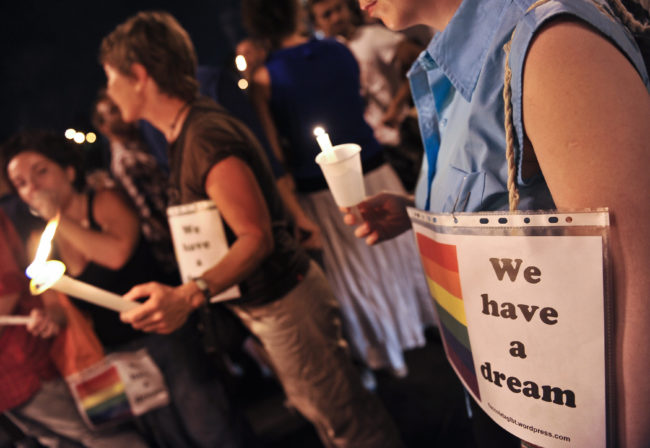Italy blocks survey on homophobia for ‘promoting sexual fluidity’

The anonymous survey would have asked respondents to identify their sexual orientation. (Tiziana Fabi/AFP/Getty)
The Italian government has blocked the distribution of a survey meant to research instances of homophobia, racism and sexism among young people after it was criticised for “promoting sexual fluidity.”
The anonymous survey from the University of Perugia was meant to poll teenagers studying in the central Italian region of Umbria on a range of topics pertaining to gay rights—though it makes no mention of transgender issues—women’s rights and migration issues.
Survey respondents would be asked to indicate their nationality and that of their parents, their religious beliefs, political affiliation and sexual orientation—there is no mention of gender identity—choosing between the options “exclusively heterosexual, predominantly heterosexual, bisexual, predominantly homosexual, exclusively homosexual, asexual.”

Italian gay rights supporters take part in a ceremony to protest against an increasing number of homophobic attacks throughout predominantly Roman Catholic in Italy in front of Rome’s Colosseum, on September 4, 2009. (Photo credit should read Andreas Solaro/AFP/Getty)
They would then be asked to indicate the degree to which they agree with a series of statements including: “Women get offended too easily,” “homosexuality is a psychological disorder,” and “immigrants take Italians’ jobs.”
Part of the survey also asked respondents to identify whether they have been involved in episodes of various forms of bullying as either the victim or the perpetrator.
“Research on homophobic bullying, racism and gender-based violence helps understanding the environment students are exposed to at school and the level of safety each student experiences compared to their peers,” the survey’s lead researcher, Professor Federico Batini, told PinkNews.
The survey was set for distribution across 54 schools in the region, but was met with criticism by local politicians, who accused it of “promoting sexual fluidity.”
Last week, regional councillor Claudio Ricci said the questions were potentially infringing on families’ “educational freedom” on the “very delicate” issue of sexual orientation. “[The survey] implies a message of uncritical approval of sexual fluidity (homosexual pseudo proselytizing),” he protested, quoted in local news outlet Terni Today.
The ‘sexual fluidity’ controversy reaches national level
The local outrage caught the attention of Senator Simone Pillon, a member of the ruling far-right League party, who was among the founders of the anti-LGBT movement Family Day that campaigns against civil unions.
Pillon’s language in protesting the survey is similar to Ricci’s, echoing his claim about sexual fluidity.
“Hiding behind the fig leaf of homophobia, the survey seems to actually want to promote a style of sexual fluidity,” he said, quoted in the local publication Corriere dell’Umbria.
Pillon called for the survey to be withdrawn, claiming it was “dangerous” for young people and promised to investigate the amount of public funds earmarked for this “outrageous” episode.
“It undermines the autonomy of academic research.”
— Professor Federico Batini
Education minister Marco Bussetti gave in to the protests, declaring a halt to the survey distribution on Sunday (December 9), according to the Corriere dell’Umbria.
“We blocked [the survey], we have asked [researchers] to review its formulation,” the minister told the news outlet, claiming that a number of schools had rejected the questionnaire.
Professor Batini, rejected the minister’s interference. “It undermines the autonomy of [academic] research in Italy, which is protected by the constitution,” he was quoted as saying in the Corriere dell’Umbria.
“A lot of lies have been said,” Batini continued, insisting that the survey distribution had not yet begun and that participation to the questionnaire was voluntary.
He added: “This controversy was stirred solely over issues of a political and ideological nature.”
Batini, who expressed disbelief at the idea that the survey could be seen as a form of indoctrination as the local politicians claimed, told PinkNews that the questions requesting respondents to declare their sexual orientation, political affiliation and religious beliefs had already been removed after a headmaster objected to their inclusion.
The professor said he was hoping restart the research project soon, proposing changes to the survey and continuing to work closely with schools and school authorities.
This article was updated with comments received after publication.

